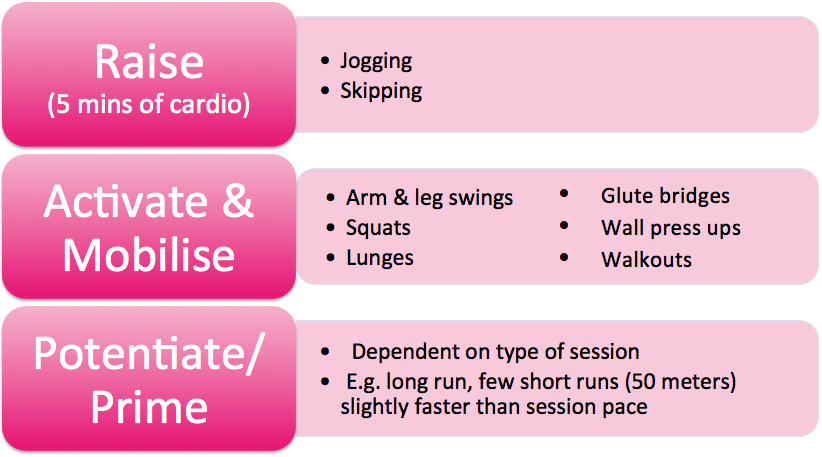Athletes- How to Keep Training
Are you an athlete? Do you exercise regularly? Participate in a team or individual sport?
To help prevent the spread of coronavirus, the UK has been in lockdown since the end of March and will continue to do so until further notice. This presents some challenges to maintaining a physically active lifestyle. With sports centres closed and events cancelled, many of us will now have to change up our usual training routine. Regardless of what you were participating in before lockdown, with all these changes, you may be concerned with how this will affect your training.
So how can you continue to train during lockdown?
Cardiovascular/Aerobic Fitness
It only takes a couple of weeks of no training for your aerobic fitness to decrease. Luckily, you can still go outside once a day for exercise such as a run, walk or cycle, as long as you follow the government guidelines. So make sure to keep a minimum of 2 metres apart from anyone you pass whilst out, and only exercise alone or with members of your household!
If you usually go for a run, cycle or walk once a day, then you can stick to your normal training routine and maintain your aerobic fitness.
However, there are other ways you can keep your aerobic fitness with workouts at home and in the garden.
Skipping Rope
Using a skipping rope, if you have one, is a good way of maintaining cardio. The intensity is what you make it- just like running! You can set a fast pace to really challenge yourself, or slow it right down and use it as part of your warm-up. Additionally, it has the benefit of strengthening your leg muscles. This will help to reduce your chances of injuries around the lower legs and can improve your running performance. It can also help improve the coordination between your eyes, hands and feet.
Circuits
Using your own body weight with a circuit-type program can be an effective way to maintain strength and aerobic health. They are sometimes favoured over your typical run, walk and cycle, as they can be done at home and require less time. Bodyweight workouts can incorporate a variety of movements that don’t require equipment. The video below shows some of these bodyweight exercises you can try as part of a circuit or as a stand-alone exercise. Please be aware that these exercises are at a higher level of intensity and difficulty so may not be suitable for everyone.
Half/Full Marathon Training
Were you perhaps training for an upcoming half or full marathon, which was cancelled? Were you relying on a set training plan and are now unsure how to maintain your progress?
It is unlikely for any sports events to be rescheduled anytime soon, so it is recommended that you keep up with your training by doing lots of easy running. You won’t need to be doing your really long weekly training run, however, you will want to maintain your weekly running volume. You can do this by spreading the mileage over the week with short and medium runs, and a slightly longer run.
Speed/Sprints Training
The only way you can run fast is if you train fast. As with any form of fitness, if you aren’t training it, you will slowly lose the ability to perform at that level. Many sports require you to sprint so it is often an important part of your training regime. Even if you are an endurance athlete, sprint training can help your performance!
Sprint training can be done outside (whilst following government guidelines) as long as you have a clear area and the ground is stable. You can even make use of hills for resisted sprints, which will help develop your acceleration and increase the intensity of the session.
Strength/Resistance Training
Like aerobic fitness, you will start to lose some of your strength if you are not training for a few weeks. However, maintaining your strength may be a little harder than trying to maintain your aerobic fitness. You might be fortunate enough that you can make a home gym, but what if you don’t have any equipment or weights?
You can use household items to provide you with some resistance.
Examples include but are not limited to:
- Cans/tins of food
- Bags of fruit/veg
- Water/juice bottles (fill with water for weight, full 1L bottle=1kg)
- Backpack filled with objects for weight
Obviously, unless you have the equipment at home, it is unlikely you will be able to reach the weights you would be lifting whilst in the gym. A little tip is to try doing more single-leg or single-arm work. This would naturally require less weight and means you work individual sides. If you are significantly stronger on one side, you might find that when using both arms or both legs in an exercise, that side takes more of the weight so you aren’t working them equally.
Usually, when we try to improve our strength, we would gradually increase the weight that we use. This is known as progressive overload. However, even if we can’t increase the weight we use, we can still achieve overload in our sessions by changing other things:
- Increasing the volume (doing more sets or reps)
- Increasing the time under tension (take longer to lower or have a pause during a squat)
- Increasing the intensity (reducing rest times between sets)
You might think that strength work is only for power athletes but it can actually help improve your performance if you are an endurance athlete. Take running as an example. Strengthening the main muscles you use during running (legs) will make your running more efficient and can help to reduce your injury risk too.
What else can you do?
How is your balance and coordination? Do you need to improve your flexibility? Is your technique the best it can be? Or perhaps you need to further develop strength in parts of your body?
These are all important health and skill related aspects of fitness and will have an impact on your performance. This is a unique opportunity, with sports events being cancelled for the foreseeable future, to work on things that need further developed that you may not usually be able to devote a lot of your training to.
Injury Prevention
Injury is a common concern for athletes, regardless of what level they compete at, and something they hope to avoid so it doesn’t impact on performance.
Despite being in lockdown, there is still a chance you may get injured. You may find yourself training more to try ward off boredom from being at home longer. Injuries are likely to occur if you train too hard too quickly and in a repetitive way. So what can you do to reduce your chances of getting injured during lockdown?
- Make sure to sufficiently warm-up: A good warm-up will ensure the body and mind are prepared for the session you are about to undertake. This can be done using the RAMP method. Raise your heart rate and body temperature. Activate and mobilise the key muscles and specific joints that will be used during a session. Potentiate or prime the body increasing the intensity and replicating activities that will be performed within the session.
Below is an example of a basic warm up 
- Eat and drink well: Nutrition and hydration are both very important for recovery and can have a big impact on our health and performance. Whenever we train, we need to refuel with food and liquids to replace what is lost.
- Let your body recover from sessions: When working on particular muscle groups, don’t train them 2 days in a row. This will affect your body’s ability to recover fully from a session and may put you at risk of injury.
- Get enough sleep: You can increase your chances of an injury if you regularly aren’t getting a sufficient amount of sleep.
- Cross-train/Vary activity: Avoid doing the same thing every session. For example, you don’t always need to do the same form of cardio, you could go cycling instead of running. This will avoid placing repeated stress on joints, tendons and muscles.
- Include strength training (if you don’t already): Overuse injuries can be halved with adequate strength training. Programmes should be tailored to your individual development and injury prevention needs.
- Gradually build training load and intensity: Don’t be tempted to push your training too quickly, even if you are feeling good. Make sure to follow your training plan and listen to the advice of your coach if you have one.
- Focus on technique: Make sure you have good technique, whether that is related to specific sport drills, or improving techniques for strength and conditioning exercises. If your technique isn’t correct this can put you at risk of an injury, especially if you start to add in weight or speed to an exercise.
Motivation
You may be finding it difficult to stay motivated about training during the lockdown. After all, you could have been training for specific sporting events, which have now been cancelled/postponed, or you’re used to training as part of a group and are now finding it difficult to train alone.
Try setting yourself some short and long-term goals for during lockdown. This will give you something to aim for and act as a way to track your progress. Also, try to keep in regular contact with your friends and those you train with. You can set each other challenges and having the social interaction will help with your mental wellness.
Reducing Stress
As well as looking after your physical fitness, your mental well-being is just as important. Exercise can help to improve your mood, reduce stress and improve your sleep. Yoga and Pilates, in particular, are good examples of exercise for physical and mental health. If you are interested in trying Pilates, Majka has recorded some introductory exercises you can try.
https://www.physio-flex.co.uk/pilates-with-majka/
During these uncertain times, it is understandable that you may feel more stressed or anxious. Although you may be training regularly during the lockdown, you may feel this isn’t enough to manage your stress.
You can try different relaxation techniques to help reduce your stress levels.
Some examples include:
- Meditation
- Mindfulness
Sportscotland has produced a guide for mindfulness, and the NHS has a mindfulness section you may find useful.
Both are linked below
https://sportscotland.org.uk/media/5637/mindfulness-complete-guide.pdf
https://www.nhs.uk/conditions/stress-anxiety-depression/mindfulness/
Sleep and Nutrition
The most effective way to improve in sport is to be able to maintain a level of consistent and effective training, which requires you to be able to recover sufficiently between sessions. Two ways of ensuring proper recovery are sleep and nutrition.
It is suggested that for sleep to have a restorative effect on the body, adolescents should have between 8-10 hours, and adults 7-9 hours. Try to make sure you are getting enough sleep whilst also sticking roughly to your usual sleep and wake times.
The nutrients your body needs is provided by the food you eat, however, it’s important to realise that no one specific food group by itself is sufficient to provide everything the body needs. Eating a well-balanced diet that includes all food groups will help you to maintain good health and can even help improve your performance.
The team at sportscotland have released a nutrition fact sheet and a wellbeing guide that may interest you.
If you have any questions or want to discuss any barriers or injury issues that may be stopping you from training, get in touch at bookings@physio-flex.co.uk or on 01506237770 to speak to one of the Physioflex Team.


